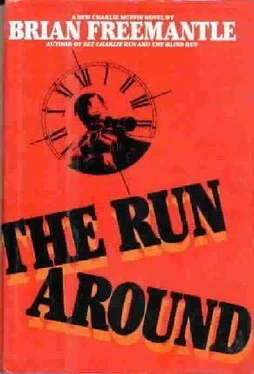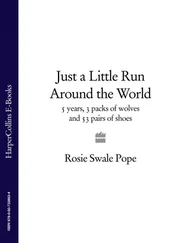Brian Freemantle - The Run Around
Здесь есть возможность читать онлайн «Brian Freemantle - The Run Around» весь текст электронной книги совершенно бесплатно (целиком полную версию без сокращений). В некоторых случаях можно слушать аудио, скачать через торрент в формате fb2 и присутствует краткое содержание. Жанр: Шпионский детектив, на английском языке. Описание произведения, (предисловие) а так же отзывы посетителей доступны на портале библиотеки ЛибКат.
- Название:The Run Around
- Автор:
- Жанр:
- Год:неизвестен
- ISBN:нет данных
- Рейтинг книги:3 / 5. Голосов: 1
-
Избранное:Добавить в избранное
- Отзывы:
-
Ваша оценка:
- 60
- 1
- 2
- 3
- 4
- 5
The Run Around: краткое содержание, описание и аннотация
Предлагаем к чтению аннотацию, описание, краткое содержание или предисловие (зависит от того, что написал сам автор книги «The Run Around»). Если вы не нашли необходимую информацию о книге — напишите в комментариях, мы постараемся отыскать её.
The Run Around — читать онлайн бесплатно полную книгу (весь текст) целиком
Ниже представлен текст книги, разбитый по страницам. Система сохранения места последней прочитанной страницы, позволяет с удобством читать онлайн бесплатно книгу «The Run Around», без необходимости каждый раз заново искать на чём Вы остановились. Поставьте закладку, и сможете в любой момент перейти на страницу, на которой закончили чтение.
Интервал:
Закладка:
Outside again Zenin followed the Guiseppe Motta route, because it brought him more immediately close to the building from which he was going to have to shoot.
It was a necessarily high building, in a street just off the Colombettes road, an apparent combination of office suites and apartments. Zenin knew the rooms that had been rented for the past two months were on the top floor of the north-east corner, providing a supposedly uninterrupted view from two separate windows of the grassed area where the commemorative photographs of the delegates were customarily taken. Having found fault with so much else in the local information Zenin accepted he would have to verify that but decided against doing it today. His connection with the apartment had to be restricted to the absolute minimum, so that particular but essential confirmation would have to wait until he installed the weapon. It would be necessary, also, properly to assess how long it would take him to get out of the flat, descend twenty storeys and regain the street. The embassy gave an estimate of seven minutes but Zenin was contemptuous now of all their timings.
He went back on to the Colombettes road and walked up to the multi-lane Ferney highway, nodding appreciatively at the noise, recognizing at once and with professional awareness that the traffic roar would mask completely the muted sound of the shots and certainly make any directional fix practically impossible. Just as quickly Zenin saw an additional advantage. Vehicles flooded by in an unbroken stream: it was virtually inevitable that any security sweep, no matter how well rehearsed and co-ordinated, would become snarled up in it.
Zenin went in the direction of the Place des Nations, turning frequently to focus upon the building he would be using, easily able to isolate the corner windows through which he would be firing. He stood sideways, moving his head from the high apartment to the international area and then back up again, trying with trained marksman’s expertise to visualize the trajectory. It was very difficult, as low as he was, but it appeared to be unimpeded although there were some avenues of decorative trees about which he was unsure. They would have to remain another uncertainty that could only be resolved when he actually got into the apartment.
Zenin returned finally to the Cornavin station, more than satisfied with the visit. The next time would be to meet the girl, he reflected, as he took the Peugeot out on to the Bern road. He had the photographs, of course, because identification was essential but he wondered again what she would be like, beyond their sterility. The pictures showed her to be very attractive: it might be an interesting diversion for their encounter to be anything but sterile.
Three of the aircraft had been short-haul airbuses, with a smaller cabin crew, so Charlie’s estimate of a hundred and eighty was reduced but not by much.
He managed to interview nine the following day, four from the Alitalia plane and five from the Austrian airline flight to Vienna. There was not even a hesitant recognition from any of them.
That night, at the hotel, Charlie sat with his diminishing whisky bottle beside him, hunched with all the information he possessed spread out on reminder sheets around his stockinged feet, the blurred print forming the centrepiece. Directly alongside was the list of European political events, the first only nine days away.
Charlie looked back to the picture and said: ‘Where the fuck are you, whoever you are!’
Chapter Thirteen
By the end of the third day Charlie Muffin had unsuccessfully interviewed thirty-two members of the cabin staff of six different airlines, was well into the second bottle of room-service whisky, had discovered the Mercedes scratched in the hotel car park and was under increasing pressure from Sir Alistair Wilson to accept more people to conduct the hopeful photo-identification sessions, which was unnecessary because the delay in locating and bringing to England the stewards and stewardesses who had left London during those vital three hours meant there were long periods each day when there was no one even for Charlie to interrogate. And he thought the food at the airport was absolutely bloody awful: by the second day he’d had diarrhoea. That night, not bothering with dinner because of the stomach upset, which he was treating with the remains of the second bottle, Charlie accepted he’d soon have to submit to the Director’s insistence, pointless though it might be. He’d been in similar, cul-de-sac situations a dozen times before and the headquarters reaction was always the same, a determination to create movement in the belief that the direction would automatically be forward. He guessed it made them feel better. He wished he did.
The demands to the European embassies had fortunately not produced any further political events, which would have meant widening the search and made it more difficult than it already was and so far the Watchers had not come up with anything new. Charlie almost wished they would. He had been truthful putting this possibility no higher than fifty per cent during the meeting with the Director but was by now more conscious than he had been at the beginning of the upheaval his interview demands were causing. There would be no necessity for an explanation or apology to any of the airlines if the whole thing ended as unproductively as it had so far proved to be but Charlie knew that behind the undesignated doors of Whitehall and within the department his balls would be used for squash practice and not just for the game, either. Once — just once — it would have been nice to stand under a shower without knowing it was someone pulling the flush over his head.
And then the following morning the first person he interviewed was a senior Swissair stewardess named Eva Becker who studied the Primrose Hill photograph with Teutonic intentness, looked up at him serious faced and said: ‘Yes.’
‘Yes what?’ asked Charlie, cautiously.
‘I think I have seen this man.’
‘On the thirteenth?’
‘Yes,’ said the stewardess. ‘It was flight 837.’
He knew all the answers already but it was important that everything came from her, without any prompting or assumption from him. He said: ‘What time?’
‘Twenty hundred.’
One hour after the immigration episode: the timing could not be more precisely right. Charlie said: ‘Where does that flight go?’
‘Geneva,’ she said.
‘And then?’
‘No where,’ she said. ‘It terminates there.’
‘Why do you think it was him?’
‘I thought he was rude,’ said the woman.
‘Rude?’
‘He refused any drinks. Or the food snack,’ she said. ‘When I offered again — it’s customary to do so — he said he’d already told me he didn’t want anything and hadn’t I heard him. It was very impolite. Wilfred thought so too.’
‘Wilfred?’
The woman nodded behind her and through the glass of the fishbowl office Charlie saw a man in a Swissair uniform, waiting to follow her. She said: ‘We were flying together that evening. Like we are today.’
The steward’s full name was Wilfred Stemi. Charlie was careful to ensure there was no conversation whatsoever between them when they exchanged places, from which she might have alerted the man and Stemi identified the photograph as positively as she had done and for the same reasons. And with an acceptably minimal degree of difference from that assembled by the professional analysts he provided a satisfactory physical description of the man, just as she had done.
It had been a packed flight, without one vacant seat, and when Charlie retrieved the manifest from the Swissair passenger computer he counted sixty English-type names likely to be travelling on British passports. There were three Smiths.
Читать дальшеИнтервал:
Закладка:
Похожие книги на «The Run Around»
Представляем Вашему вниманию похожие книги на «The Run Around» списком для выбора. Мы отобрали схожую по названию и смыслу литературу в надежде предоставить читателям больше вариантов отыскать новые, интересные, ещё непрочитанные произведения.
Обсуждение, отзывы о книге «The Run Around» и просто собственные мнения читателей. Оставьте ваши комментарии, напишите, что Вы думаете о произведении, его смысле или главных героях. Укажите что конкретно понравилось, а что нет, и почему Вы так считаете.












